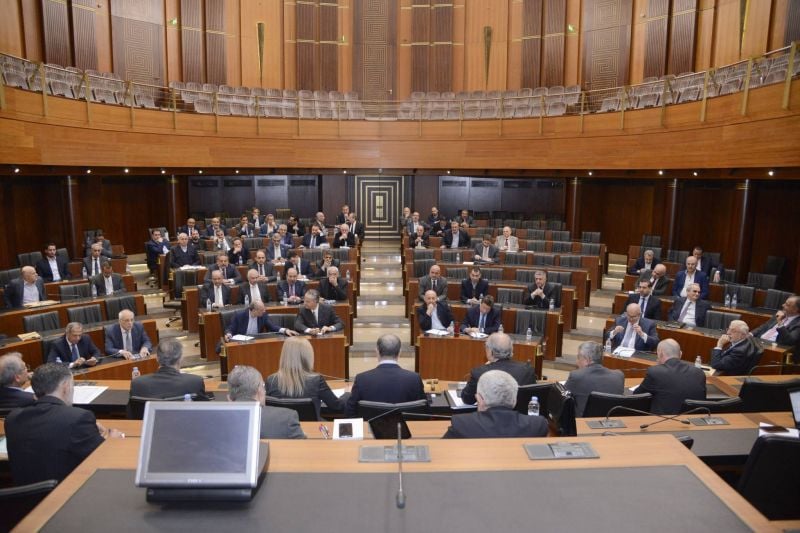
A meeting of joint parliamentary committees in March, 2023. (Credit: Parliament via Flickr)
Want to get the Morning Brief by email? Click here to sign up.
A parliamentary joint committee meeting devolved into a shouting match, leaving the status of May’s municipal elections unclear. The session reportedly ended without any decisions having been reached on any of the session agenda’s eight items after bickering between Amal Movement MP Ali Hassan Khalil (Marjayoun-Hasbaya) and Kataeb MP Sami Gemayel (Metn) over organizing municipal elections. The meeting had already been tense after Forces of Change MP Melhem Khalaf’s (Beirut II) speech was repeatedly interrupted by Amal Movement MP Ghazi Zeaiter (Baalbeck-Hermel), who later said he was offended by his colleague’s opening remarks that claimed Parliament can only act in an electoral capacity until the end of the presidential vacuum (in effect since Nov. 1), Forces of Change MP Paula Yacoubian (Beirut I) told L’Orient Today. The current municipal councils' terms expire on May 31, which MPs will have to extend if they don’t release the funds necessary for the Interior Ministry to organize the election. Lebanese Forces spokesperson Charles Jabbour previously claimed that cabinet could bypass Parliament to hold the elections by using Lebanon’s International Monetary Fund Special Drawing Rights — which Khalil yesterday refused “to legally cover.” Last week, the topic of municipal elections caused tensions between LF head Samir Geagea and Khalil, with both parties accusing each other of impeding the ballot. Caretaker Interior Minister Bassam Mawlawi also said he would “convene the electoral body on April 3” if Parliament does not postpone the elections.
The US Department of the Treasury announced sanctions against drug kingpins Nouh Zeaiter and Hassan Daqqou for their alleged roles in facilitating the export of Captagon in collusion with Syrian regime affiliates. The Treasury’s Office of Foreign Assets Control (OFAC) expanded its list of sanctioned individuals to include Zeaiter and Daqqou in addition to four alleged “allies” of Syrian President Bashar al-Assad’s family. The statement claims Daqqou continues illicit activities despite his 2021 arrest in Lebanon over drug trafficking charges. It described him as a “facilitator of smuggling across the Syria-Lebanon border,” protected by associates of Hezbollah — an OFAC-designated entity, with whom dealings render individuals liable to be sanctioned. Meanwhile, Zeaiter, a notorious fugitive pursued by Lebanese authorities, is targeted for “close ties to both the Syrian Arab Army’s Fourth Division [also an OFAC-designated entity] and certain members of Hezbollah.” Lebanese authorities have repeatedly called for a crackdown on Captagon smuggling while security forces regularly intercept drug shipments allegedly intended to be trafficked. Last April, drug trafficking soured relations with Saudi Arabia, which banned the import of Lebanese produce after discovering thousands of Captagon pills seeded inside a shipment of pomegranates.
Public school teachers in Kesrouan, north of Beirut, and municipality employees in Tripoli held separate protests demanding improved working conditions. The municipality employees — who earn no more than “a dollar a day,” according to their union head Omar Dalal — blocked the gate to the local Banque du Liban (BDL) headquarters for a second consecutive day, demanding the payment of their salaries at the central bank Sayrafa rate, L’Orient Today’s correspondent in the area reported. The public school teachers protested outside the Jounieh Serail for better working conditions weeks after a controversial decision was made by some public educators’ unions to end a months-long strike making the same demands. Public sector employees have repeatedly protested the devaluation of their salaries which is a result of the lira’s losses on the parallel market.
Kataeb MP Salim Sayegh (Kesrouan) called for the formation of a parliamentary committee to investigate “criminal intent” surrounding plans to construct a second terminal at Beirut's airport. Sayegh’s request must be processed by Parliament Speaker Nabih Berri during an upcoming session. Caretaker Public Works Minister Ali Hamieh announced on March 20 a $122 million project to open a second airport terminal by March 2027. The second terminal could accommodate an additional 3.5 million passengers per year. Beirut’s airport can currently accommodate about six million people per year and it has been regularly operating beyond its capacity. The new terminal project received praise from officials and stakeholders in the public sector and severe criticism from others questioning its legality.
In case you missed it, here’s our must-read story from yesterday: “The daylight saving debacle: Everything you need to know”
Compiled by Abbas Mahfouz